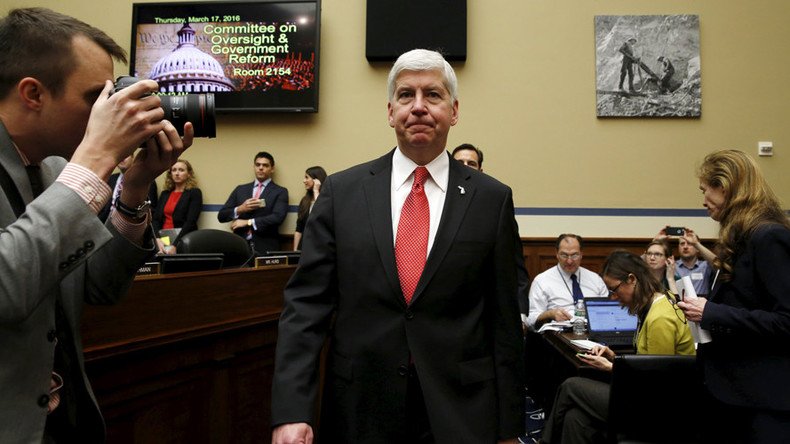Michigan Gov. blames staff for lead contamination of Flint water

Contradicting previous statements on when he first learned about Flint’s lead water crisis, Michigan Governor Rick Snyder attributed the state’s late response to the public health emergency to his own staff, in a speech to a Detroit audience.
“One of the frustrating things for me is that I learned about it at the end of September, in terms of our experts finally acknowledging it,” Gov. Snyder told an audience attending a breakfast event in Detroit on Monday, according to WDIV.
Snyder said he scheduled a conference call on September 28, 2015 with the Michigan Department of Environmental Quality (MDEQ) and the state’s health department to address the water issue in Flint after outside experts declared a public health lead problem. The night before the call, he was told by staff there wasn’t “really a problem” with Flint’s water.
"I remember the date, it was September 28. I finally said, 'Look, we gotta have a conference call with the (MDEQ), the Department of Health and Human Services,'" Snyder said.
"I get a briefing on the night before telling me that there really isn't a problem in Flint, that these outside experts aren't correct. So I get on the call and I push them, and they tell me it looks like there is a problem. That's the kind of thing you never want to see. And talk about getting upset. I was upset, because what's going on here?"
Rick Snyder claims his staff lied to him about the dire lead-poisoning situation in Flint https://t.co/92cOxTh5Yr
— The Daily Beast (@thedailybeast) April 11, 2016
Tens of thousands of emails released by Snyder’s office show his administration for months downplayed complaints and concerns about Flint’s water, and top aides were clued into serious problems with Flint’s water months before the state conceded it misunderstood the enormity of the situation.
‘No legal basis’: Michigan governor asks Flint water lawsuit targeting him be dismissed
— RT America (@RT_America) April 9, 2016
https://t.co/lXfkygjEW1pic.twitter.com/mdiHtNIzcW
Snyder’s top legal counsel, Michael Gadola, told the governor’s chief of staff in an email in October 2014 that Flint should reconnect with its former water supplier, the city of Detroit. Gadola said the use of Flint’s river as a water supply was “downright scary,” and added: “They should try to get back on the Detroit system as a stopgap ASAP before this things gets too far out of control,” according to The Guardian.
Snyder’s latest admission contradicts previous accounts. In April, before a hearing with the House Oversight and Government Reform Committee, Snyder said it wasn’t until October 1, 2015 that he learned the water was contaminated.
At #pancakesandpolitics2016 Gov calls last 6 months humbling experience, says he won't roll up in ball & walk away pic.twitter.com/9KtFPs1LEI
— Rob Davidek (@RobDavidek) April 11, 2016
It was on October 15 that Snyder announced that Flint’s water supply had been contaminated to an extent far worse than he initially understood and approved Flint’s switch back to the Detroit water system. The governor then took two-and-a-half months before declaring a state of emergency over the lead contamination on January 16, 2016. Asked at the time when he learned of the crisis, his office issued the following statement:
“As the Governor has said repeatedly, and the record bears this out, he was not briefed on the issue until January 2016. He took action promptly and released the information publicly.”
Michigan residents begin recall petition drive against Gov. Snyder over Flint water crisis https://t.co/RgejmL3ye7pic.twitter.com/x7CQhxpPex
— RT America (@RT_America) March 28, 2016
Snyder also told the Detroit audience on Monday that he will not resign despite calls for him to do so. He is term-limited and cannot run for re-election in 2018.
“A Michigander just doesn’t walk away from things,” he said. “If you have something happen on your watch, people that created this issue work for me, so I took responsibility, and you go out and solve the problem, so they can continue their calls. I’m going to continue to focus on solving the problem.”
About 30 protesters marched outside the Detroit Athletic Club during the breakfast, calling for Snyder’s resignation.
Gov. Snyder speaks at Detroit Athletic Club, met by protest: DETROIT (WJBK) - A handful of protesters... https://t.co/WAI3fVMwJ2#Detroit
— Detroit News 360 (@DetroitNews360) April 11, 2016
A poll released last month found that 75 percent of voters believed Snyder hadn’t handled the situation in Flint well, and 41 percent believed he should resign, up from 29 percent in January.












